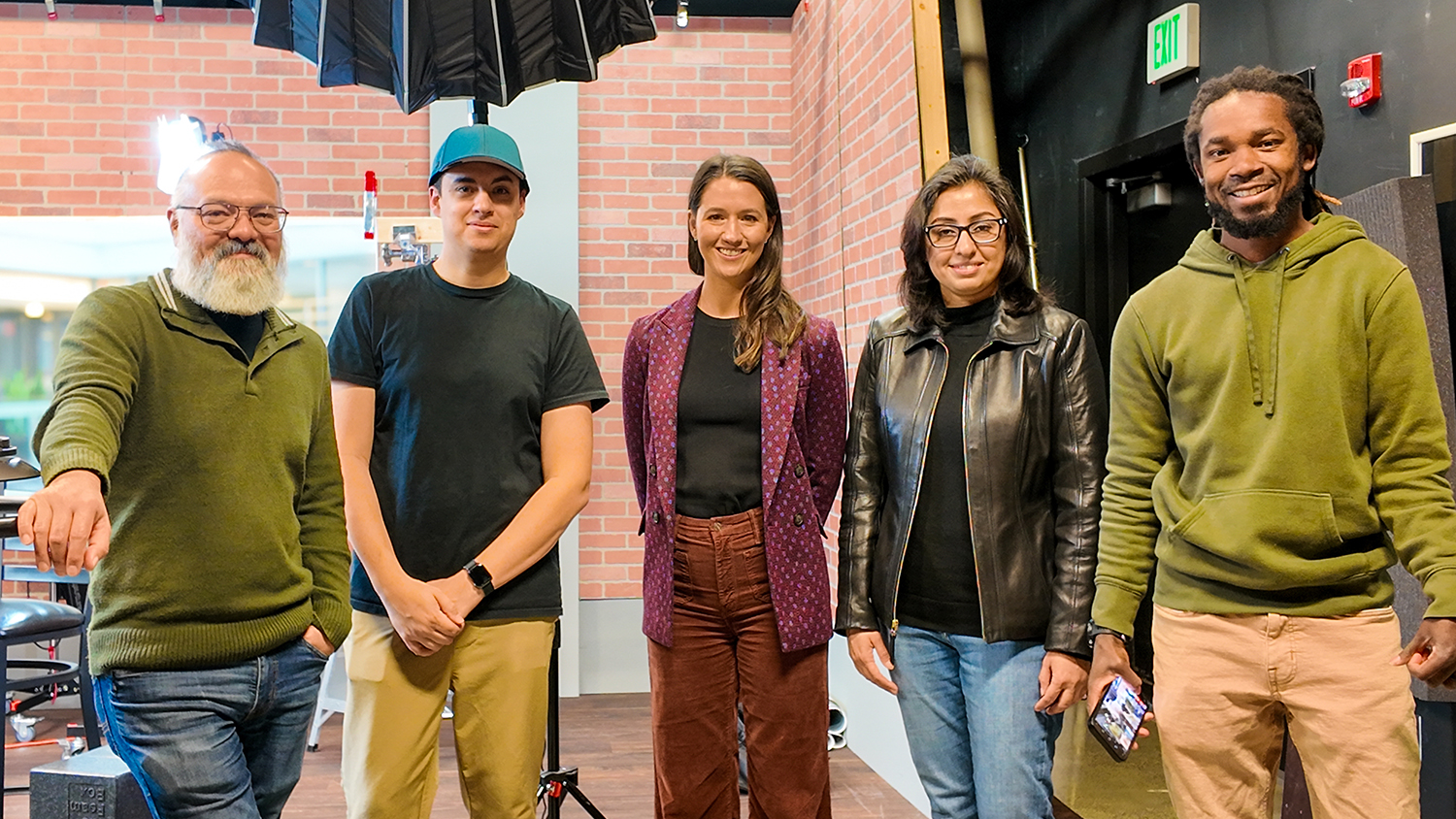Wielding generative artificial intelligence (GenAI) tools in the classroom offers seemingly limitless opportunities for both instructors and students to learn, collaborate and explore — but incorporating these tools in the classroom is not without its challenges.
The rate of innovation in AI technologies, particularly GenAI, is increasing exponentially. This rapid growth is compelling institutions of higher education, NC State included, to grapple with questions of ethics, equitable access, campus governance and implementation policies, privacy concerns and AI’s environmental impact — both in its contemporary use and its anticipated use in the future.
Using these questions as a framework from which to address pedagogical challenges, DELTA researchers, instructional technologists, multimedia designers and other specialists are partnering with instructors and staff from across NC State to guide classroom AI implementation effectively.
Several 2024-2025 DELTA Grants are exploring the use and implementation of AI tools in virtual and hybrid courses at NC State across multiple colleges and divisions. A key focus area of these grants is considering strategies for teaching ethical and effective use of GenAI to students with varying degrees of AI literacy.
“By equipping students with the knowledge and skills to use AI responsibly, educators can ensure they flourish in the AI-driven future,” explained Sarah Khan, a DELTA grant recipient and teaching associate professor in the Department of Business Analytics in the Poole College of Management. Khan, who is also a DELTA Faculty Fellow, focuses her research on information systems and big data.

In addition to our grant recipients, several DELTA Faculty Fellows are also exploring AI as a pedagogical tool. As GenAI increasingly migrates into NC State’s enterprise software and students’ everyday platforms, instructors urgently need to understand their potential — and potential limitations or misuses.
“The rapid appearance of GenAI has far outpaced our pedagogical and ethical frameworks for its use,” explained Faculty Fellow Paul Fyfe, an associate professor in the Department of English. “DELTA provides a forum in which instructors and stakeholders from across the university can tackle these issues together.”
DELTA Researchers at the Forefront
The DELTA Research and Analysis team is helping to shape NC State’s approach to data-driven research about educational AI tools and their classroom implementation.
DELTA researchers collaborate with faculty, staff and students to design, collect and analyze student perceptions of learning outcomes related to digital learning initiatives. Their approach to this process focuses on best practices as they relate to educational technology — and they continually strive to promote, advance and fine-tune their research and analysis approach.
Register for the half-day DELTA workshop Your AI Course Assistant: Design, Assessment, Instructional Materials and Activities on Feb. 7
Along with various other projects, DELTA researchers participate on grant project teams considering the various implications of AI tools in NC State classrooms — including an exciting Exploratory Grant that is investigating student perceptions of AI use to foster experiential learning experiences.
Case Study: Preparing Future Business Leaders in Effective and Ethical Use of Generative AI
For Khan, AI has become central to the teaching and learning experience. A technology enthusiast and advocate for the educational value of generative AI, Khan is partnering with DELTA this year on a grant project for Business 444, Systems Analysis and Design. This course examines the development of technological information systems in the context of business design.
Her grant project, Expanding the Exploration of GenAI to Supplement Student Learning in STEM Courses, is a continuation of a 2022-23 DELTA grant. Khan and the project team researched and benchmarked widely available large language models (LLMs) for accuracy and reliability.
An LLM is a machine learning AI model that uses neural networks to understand and generate human language. LLMs are trained on large amounts of text and code to perform text-based tasks, such as language translation, content generation and content personalization.
BUS 444 trains students in business technology consulting practices, so the current grant is exploring the potential for using GenAI to train chatbots in simulating consulting use cases. The goals of the grant are twofold: Create authentic experiential learning opportunities using chatbots that teach students how to solve complex business challenges, and foster greater AI literacy for students through deeper understanding of the capabilities and limitations of LLMs and GenAI.
“Future business leaders will need to know a lot about generative AI, because it is going to change the landscape of work and our daily lives,” said Sarah Egan Warren, DELTA Faculty Fellow and teaching assistant professor in the Institute for Advanced Analytics.
“And what I mean by knowing a lot about AI is experimenting with it, understanding it, knowing what it can do…and what it can’t do,” she continued. “Understanding where AI falls apart is just as important as understanding what it can do.”
Khan’s grant team includes multimedia support from Stephen Waddell, an immersive media developer and one of DELTA’s experts in GenAI. Waddell’s contribution involves evaluating available AI technologies — such as ChatGPT, Perplexity Spaces, Gemini, LibreChat and Copilot — to determine the most cost-effective, scalable and secure option for developing a multimodal chatbot. That is, a bot that can be trained to chat with students in a face-to-face experience, rather than merely analog (typing or texting) interactions.
Gemini, Google’s GenAI chatbot, is now available free to NC State students, faculty and staff.
Part of Waddell’s work, and a major point of emphasis in Khan’s teaching, is helping students understand how and why chatbots give misinformation. Often referred to as hallucinations, AI-generated misinformation or misleading data frequently occurs when the AI is trained with incorrect, biased or insufficient information.
Waddell and Khan are using a retrieval-augmented generation (RAG) model technique to improve their LLM performance for more accurate chatbot responses.
“Even custom GPTs misfire,” said Khan. “Students must learn to question AI outputs, recognizing that they may provide AN answer, but not necessarily THE answer.”
Khan has also enlisted the help of industry experts from her professional network to partner with students in content creation for the chatbots. These experts help to create authentic transcripts from which the chatbots pull information when conducting consulting simulations with students.
Data-driven Research
Additionally, for Khan’s grant, DELTA researchers Paul Couture and Chris Willis are looking at students’ perceptions of AI use in their educational environments; specifically, the boundary conditions wherein they feel that these technologies are useful or not, safe or not, and healthy or not. Understanding this perspective from students is valuable to instructors who incorporate GenAI into their course design.
Surveys conducted with BUS 444 students at the conclusion of the 2024 spring and fall semesters asked them to rate:
- Prior experience using GenAI
- Emotional and cognitive engagement using GenAI to complete assignments
- Perceived usefulness and value of GenAI in the course
- Perceived cost and intrinsic value of using GenAI in the course
Key research findings from both semesters indicate that students are becoming increasingly familiar with GenAI, and believe their ability to be successful in school and in the workplace is improved using this technology.
Students’ perceptions of their emotional and cognitive engagement with GenAI was more ambivalent, however, as was their understanding of the perceived costs, or limitations, of its use — costs such as misinformation from hallucinations, algorithmic bias, concerns about data privacy, impact of AI use on social skills and accessibility for students with learning disabilities or other limitations.
This data echoes many observers’ concerns that GenAI in education could discourage creativity and the development of interpersonal and critical thinking skills. Not so, say Khan, Egan Warren and other advocates — as long as instructors using GenAI tools in the classroom are the catalysts for training students to develop their AI literacy skills.
“Our goal is to teach students how to create reliable chatbot content in a controlled environment in which the AI gives specific responses, which in turn, will effectively train the students by giving them information they can actually use,” Khan explained.
Egan Warren agrees. “Critical and creative thinking skills are not going to go out of style,” she said. “We absolutely need those skills to get the best out of generative AI.”
Implementing AI Tools in the Classroom
Three additional DELTA grants are considering use cases for implementing GenAI tools in teaching and learning this year:
In his Chemistry 221 course, associate professor of chemistry Ryan Chiechi is using an Exploratory grant, Aligning Student and Instructor Expectations with Large Language Models in Chemical Education, to explore how students can use a RAG model “study buddy” chatbot to improve their academic and self-help skills. Chiechi and the project team have held student focus groups to gauge student understanding of and comfort with LLMs and GenAI in preparation for a pilot of the chatbot during spring semester.

For her Feed Mill 425 Exploratory grant, Using AR to Enhance In-person and Virtual Feed Mill Tours, Marissa Cohen partnered with DELTA to augment an existing DELTA-produced augmented reality (AR) tour of the NC State Feed Mill with a GenAI-produced docent, or tour leader. The docent will narrate the tour and answer questions for a richer learning experience.
Finally, for a Course Design grant in DSC 295, Developing Digital and Field-Based Immersive Experiences to Increase Students’ Engagement with Data Science Stakeholders, Data Science Academy staff David Stokes and Rachel Levy hope to free up class time for crucial student engagement opportunities by created an automated system for asynchronous feedback on projects and assignments. The team plans to train and use chatbots using a RAG model, similar to the approaches in BUS 444 and CHM 221.
As the larger NC State community navigates the rapidly changing landscape around GenAI in higher education, DELTA will continue to lead efforts in partnership with various campus units to effectively implement AI tools into our enterprise learning technologies supporting academic excellence.
“Ultimately, we’re all circling around the same challenge with GenAI,” said Chiechi. “Giving students a learning experience that makes learning more efficient and effective.”
Additional Resources
- Navigating the Landscape of Higher Education in the Age of Artificial Intelligence, NC State Office for Faculty Excellence
- Guiding Principles for AI Tools, NC State OIT
- Working with ChatGPT Infographic, Sarah Khan and Jessica White
- Leverage AI to Complement Your Teaching, DELTA Teaching Resources
- Designing Assignments and Activities with ChatGPT and Generative AI in Mind, DELTA Teaching Resources
- Tools to Think Through the Complexities of AI Text Generators in the Classroom, Sarah Egan Warren
- Getting Started with Generative AI, Sarah Khan
- Developing an AI Syllabus Statement & Driving Class AI Discussion, DELTA Teaching Resources
Interested in partnering with DELTA experts on a grant or research project? Learn more about our services or contact us!
- Categories:



